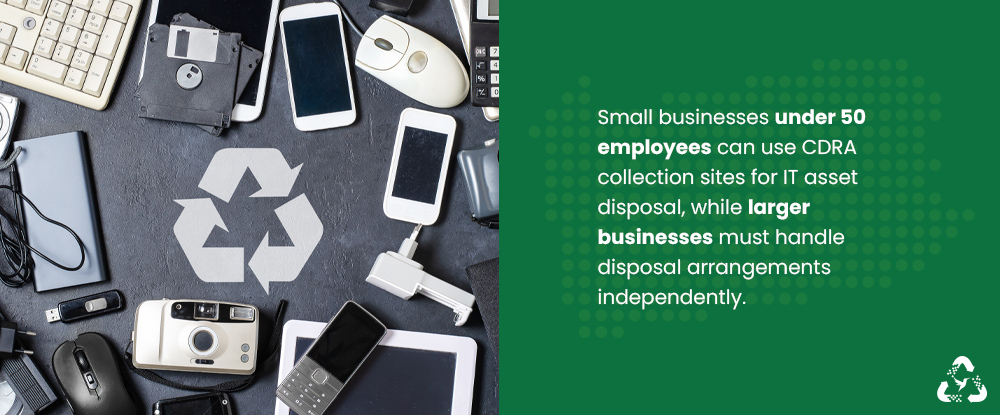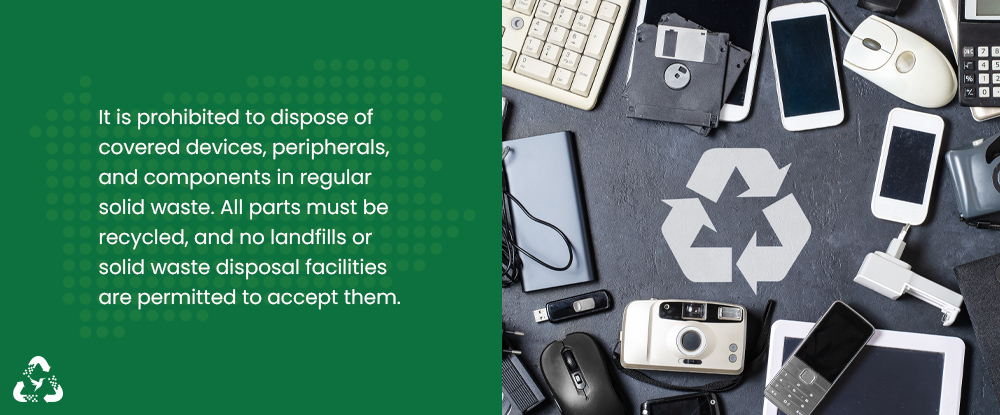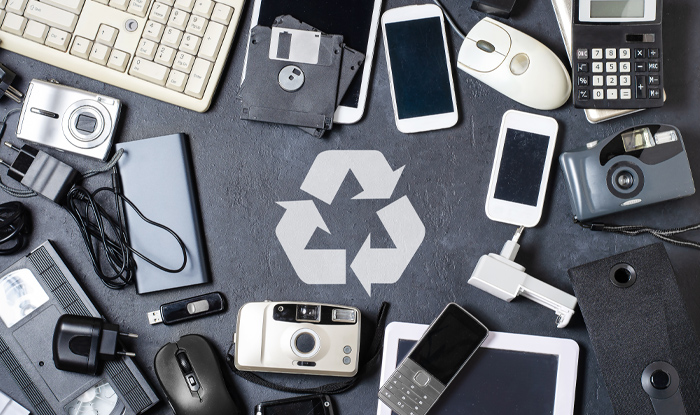Whether you are a resident of Pennsylvania or a manufacturer and supplier of covered devices, there must be a time when you want to upgrade your phone or get new computer hardware. In that case, you cannot just throw away the old one. You must abide by the Pennsylvania Department of Environmental Protection rules and regulations about secure IT asset disposal.
Covered Devices Recycling Act of Pennsylvania
The Covered Device Recycling Act or CDRA of 2010 (enacted in 2013) states that all manufacturers must provide recycling plans for computers and peripherals that they sell to their consumers. Also, businesses with less than 50 employees can use the collection sites in the CDRA. However, businesses with more than 50 employees must make their arrangements for IT asset disposal.

Small businesses under 50 employees can use CDRA collection sites for IT asset disposal, while larger businesses must handle disposal arrangements independently.
General Information
Learn about the different devices covered in the CDRA and how the Act requires major stakeholders in the ITAD process to deal with electronics recycling.
What devices and computer peripherals does CDRA cover?
Any covered device, including personal computers, peripherals, monitors, and televisions for customers in the Pennsylvania Commonwealth are included in this Act. Computer peripherals include keyboards, printers, and other external input or output hardware.
What devices and computer peripherals do not come under CDRA?
The CDRA does not cover the hardware or peripherals that fall under the following guidelines:
- A television with less than four inches of screen.
- Any type of telephone, including mobile phones.
- Other devices such as automated typewriters, servers, handheld calculators, digital assistants, GPS, MP3 players, etc.
- Devices or equipment for industrial, commercial, research, government, or medical use.
- Devices or components in appliances or motor vehicles, respectively.
Detailed E-Waste Regulations and Guidelines
The CDRA, Act 108 of 2010 has some serious regulations for everyone using, manufacturing, or supplying covered devices about their safe disposal.
The complete IT asset disposal policy and procedure checklist for the manufacture, sale, end-of-life collection, handling, and recycling of covered devices in Pennsylvania is as follows:
For Manufacturers:
- Must attach a brand name or label on their covered device.
- Must register their brand with the DEP or Department of Environmental Protection annually.
- Must construct and maintain recycling plans with covered device collection unit opportunities for consumers without any fees, except when the company presents a coupon or rebate of equal or higher value. These companies must maintain a sound IT asset disposal procedure with certified IT asset disposal services.
- Must present collection and recycling data report to DEP by the end of January each year.
For Retailers:
- Must only sell authentic covered devices that have a label from a DEP-certified brand.
- Must educate buyers about the proper recycling of the covered devices.
- Must provide collection opportunities of covered devices to customers and that too at no cost. Also, they must handle the devices’ collection and recycling properly, abiding by the rules.
For Electronics Recycling Facilities:
- This includes all electronics recycling facilities operating in or outside of Pennsylvania. The Act also includes facilities that work with or handle covered devices coming in from customers by any Pennsylvania-based collection program, whether manufacturer, retailer, or other. These all must have one of the following up-to-date and maintained certifications:
- Responsible Recycling Practices Standard or R2 Certification.
- e-Stewards Certification.
- An internationally recognized environmental safety standard for handling and processing covered devices.
- Residual e-Waste Regulations of Pennsylvania needs electronics recycling facilities operating in Pennsylvania to acquire a general DEP permit WMGR081 (stating the handling and beneficial application of electronic equipment and asset by organizing, disassembling, and/or automatic processing) before working with any electronic covered device or e-waste.
The Department of Environmental Protection in Pennsylvania:
- Will keep an updated list of registered and non-compliant covered device companies for customers and merchants.
- Will keep an updated list of all covered device collection ways for customers, including the ones provided by manufacturers and merchants on its website and available on a toll-free hotline.
- Will oversee covered devices collection and recycling plans put forward by manufacturers and ensure correct implementation of approved procedures to abide by CDRA compliance.
- Will promote covered device collection unit for ITAD, PA use so much that at least 85% of the population is aware and makes use of it.
- Will organize and arrange public education and awareness about the covered devices recycling.
Covered Devices Disposal Ban in Pennsylvania
No one must dispose of or throw any covered device, peripherals, and components with the civil solid waste. Every part must go into recycling, and no landfills or other solid waste disposal departments or facilities must accept it for disposal.

This rule does not apply to non-hazardous or residual waste that comes from the recycling of covered devices.
For Consumers:
Anyone who has a covered device from a manufacturer or retailer for personal use or small business (employees count less than 50) purpose is a consumer. They:
- Must not discard their covered device or any of its components with municipal waste.
- Must take their end-of-life or retired covered device to an IT asset disposal collection center for proper recycling, learn how to use a free e-waste pick-up, or use a mail-back collection program. Also, they can contract with a certified ITAD Pennsylvania recycling company for proper disposal.
For Businesses:
Businesses must abide by CDRA regulations of e-waste disposal for businesses.
- Must not discard their covered devices with community waste.
- Must establish their own means of recycling covered devices. If the recycling facility is Pennsylvania-based, it must possess a DEP general permit WMGR081.
Landfills and Resource Recovery Services:
- Must not, at all costs, accept disposal or discarding of covered devices or components and peripherals. However, non-hazardous waste or residuals are acceptable for them to have.
- Must put up a sign stating the unacceptance of covered devices in a visible location at the facility. They must also notify collectors sending solid waste that covered devices and components are unaccepted.
Haulers:
- Must not accept covered devices for discarding or disposal from any waste source, and must not knowingly mix covered devices with waste for disposal.
- Must transfer all covered devices collected from consumers through electronics collection programs in Pennsylvania to a registered electronics recycling company or ITAD, Pennsylvania.
- Must not charge any fee from the customer if the haulers are associated with a manufacturer’s recycling program.
Conclusion
Covered Device Recycling Act, IT Asset Disposal Pennsylvania, and the Department of Environmental Protection, Pennsylvania are all enforced by the Government of Pennsylvania. These ensure the safety of communities and people and also help businesses and the government with the correct disposal of sensitive and confidential information.
Everyone residing or working as a manufacturer or retailer in Pennsylvania must abide by these rules to avoid any serious action from the state authorities.
Proper recycling not only helps lower waste but also the gold, mercury, and nickel that covered devices contain is usable in other ways. This is only one example of the e-waste recycling terms that help this earth in more ways than one.
Safety should always be the priority. Promote recycling and go green!


Leave a Reply